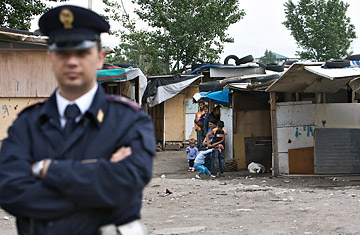
An Italian policeman patrols a Rom camp in Naples.
Coming to a stop in his two decade-old Fiat, Bologna social worker Claudio cut the ignition and yanked up the emergency break. "Get ready," he said. It was January 2007, and as part of my reporting for an article on immigration I was about to meet some 15 Roma families who'd emigrated from the former Yugoslavia in the early 1990s. Claudio's warning was partly to prepare me for the rough conditions — rusting doors and walls, leaking pipes, power cuts — that I would encounter over the next hour as the longtime city caseworker showed me around the fenced-in cluster of aluminum trailers.
But it was also designed to brace me for a human situation that is far more complicated than your typical residents' gripes over municipal services or talk-show outrage about minority rights. And different than the other immigration stories I was seeing. Get ready, Claudio seemed to be saying, to be both appalled and surprised.
My visit to Bologna comes to mind ahead of this week's meeting in Brussels on how Europe should address the issue of the Roma, or "gypsies," who have faced prejudice and mistreatment for generations.
The meeting, which will include European Union ministers, national governments and Roma organizations, is the first time the E.U. has organized a senior level summit on the Roma. The conference, which aims to begin forging a new policy based on inclusion, is well timed. Recent episodes, especially in Italy, home to some 150,000 Roma, one of the highest populations in Europe, have reminded Europeans of a problem many would rather forget. Last spring, local residents angry over crimes they blamed on Roma, burned down Roma camps on the outskirts of both Naples and Rome. Then, in July, a newspaper photographer caught Italian sunbathers relaxing on a beach near the corpses of two teen-aged Roma girls who'd drowned.
Plans by Italy's center-right government to fingerprint Roma residents in a mandatory census have also drawn fire, despite the fact that the E.U. ruled earlier this month that the scheme was legal because it was not aimed at tracking people by ethnic background, but rather fingerprinting those who had no other way of being identified.
Confronting the Roma issue in 2008 raises questions about immigration and citizenship, identity and belonging, social policy, individual freedom and collective accountability. With their ancestry tracing back to the Indian subcontinent, the Roma settled, over the centuries, across many parts of the world, but especially in central and eastern Europe. Poor and often living apart from mainstream society, an estimated 1 million Roma went to their deaths in Nazi camps in World War II.
Today, immigrants from Africa and Asia, some who have no legal right to be in an E.U. member state, are typically aching to cooperate with authorities in order to gain legal residency or citizenship. After centuries living on the margins of established European society, often choosing separate schooling and housing, it can still be difficult to pin down what Roma want from the state. Seeing the issue through the eyes of Claudio the social worker was a reminder of how much this unique ethnic group confounds fixed ideas. Bologna is one of Italy's most productive and politically progressive cities, and officials make some effort to help the Roma there. It doesn't always work and a few of the people I met were justifiably angry having been let down after promises of permanent lodging. But others in the trailer park didn't care. It wasn't that the state had failed them, it was that they didn't recognize the state's existence.
As we pulled away in his Fiat, Claudio, whose job was to work with Bologna's growing immigrant population, conceded that the issues facing the Roma were different. "You have to start with the kids," he said. "Too often, the parents are no longer really reachable." If this week's meeting in Brussels can answer the question of how to do that, it would be a breakthrough indeed.
